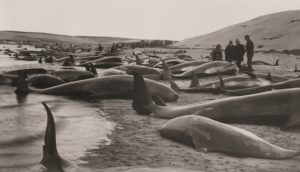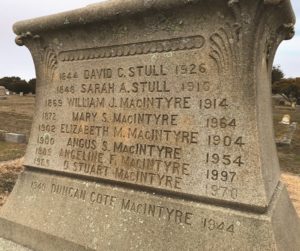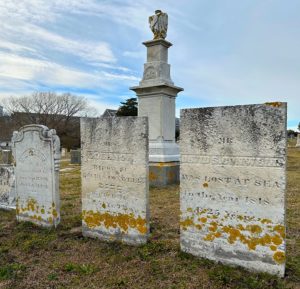It would be unthinkable today for the community to cheer on the chasing, corralling, and driving of frightened blackfish to their slaughter. But a little over a century ago, people reveled in that cruelty as the “height of Cape Cod sport.”
One 1880 newspaper story notes how the cry “blackfish” roused whole villages. Another dispatch described the scene at the shore during a whale chase as “lined with carriages, carts, men, women and children. The whole town was in a flurry of excitement. All business ceased except the one business, which was to capture blackfish.”

For Cape Codders back then, blackfish meant money. Schools of blackfish, also known as pilot whales, numbering in the hundreds, arrived in harbors here during the summer and fall. When discovered feeding leisurely at the surface, their satin skin glinting in the sunlight, townspeople wielding all manner of weapons — knives, scythes, harpoons, lances, clubs, pitchforks, and axes — manned their vessels and pursued the gregarious creatures from behind, encircling them and driving them toward shore. In shoal water, suffocating under the weight of their own bodies, the frantic cetaceans lashed helplessly. In deeper water, when a whale was wounded, others in the social group herded protectively around it, putting themselves at the mercy of the hunters.
Every townsperson who joined the chase — Thoreau witnessed just a such a chase in July 1855 and wrote about it in his Cape Cod — received a share of the profits when the blackfish were sold at auction. Schools often stranded themselves, a behavior known as beaching, and townspeople who lighted upon such a scene could stake their claim to the bounty by marking their initials in the animals’ flesh.
Hunted for the oil rendered from their blubber, each “fish” yielded approximately 40 gallons. Blackfish also furnished smaller quantities (approximately two gallons) of oil extracted from the jawbone cavity and the melon, a mass of tissue in the forehead. Early on, Yankee whalers recognized the unique properties of this head oil. It did not congeal at low temperatures, nor did it corrode on brass or rust on steel. They used it to lubricate oil stones for sharpening knives and tools.
Local lore tells that in 1829 Provincetown mariner Solomon Cook (1764-1840) sent a sample of blackfish head oil to a New Bedford watchmaker named Ezra Kelley. Finding it to be superior to the porpoise oil he had been using to lubricate delicate mechanisms, Kelley engaged Cook to supply him with oil, an arrangement that continued with Cook’s son, Capt. Caleb Cook (1808-1894). Caleb expanded his manufactory, securing a Cape-wide monopoly on the purchase of blackfish heads and making Provincetown the premier emporium for head oil.

His eventual successor, David Conwell Stull, was born in 1844, the son of George Stull Jr. and Eliza Perry Conwell, both born in Provincetown. The Conwell and Stull families both endured their share of the tragedies that plagued communities whose livelihoods derived from the sea. Eliza’s father, David S. Conwell, was lost at sea in 1818, leaving his wife Eleanor, two-year-old Eliza, and a newborn son, David.
Stull’s uncle, Thomas Stull, was lost aboard the brig Ardent in 1823. Thirty years later, his father, captain and part owner of the schooner Sunbeam, was lost at sea on a passage from Boston to St. Thomas. The Barnstable Patriot reported in April 1853 that the Sunbeam had sailed in mid-December 1852 and had not been heard from since. In February 1852, the families had been bereaved of Eliza and her infant daughter, Jane Eliza, who died of consumption within days of one another.
Left orphaned, David Conwell Stull, then nine years old, and his brother, George Perry Stull, then five, joined the household of their mother’s brother, David Conwell, a prosperous merchant with financial interests in whaling and fishing.
Provincetown’s 1886 and 1890 town directories enumerate Caleb Cook as a watch oil manufacturer and David Stull as an employee of the L. Pickert Fish Company, whose premises occupied David Conwell’s East End wharf.

Stull did not get into the blackfish oil business until Cook had retired, but in time Stull, with his “keen, alert and kindly manner,” became a familiar sight at blackfish strandings, arriving quickly on the scene to purchase the heads and have them transported to his Provincetown shop. After several years of experimentation, Stull perfected the process for his delicate oil. Bottled in tiny vials, it became indispensable to the watch and clockmaking industry.
Fame came to Stull, not for his melon oil, but for his knowledge of another whale byproduct: ambergris. It was also called “floating gold.” A mysterious and coveted substance, ambergris was a valuable ingredient used by perfumers as a scent fixative. Its name comes from the French, ambre gris, meaning a resin-like substance of ashy color.
Ambergris is unique to the sperm whale. Produced in the whales’ intestines, it is an accumulation of undigested beaks from squid, the whale’s favorite food. Regurgitated, but occasionally found in the whale’s abdomen, ambergris floats until washed ashore.
Word that a whaler had arrived in port with a lump of ambergris plucked from the sea or extracted from a carcass brought David Stull to ports all over New England to assess the value of the treasure. It was said that nearly all ambergris passed through his hands in his role as a purchasing agent for French perfumers.
Mariners gave David Stull the moniker Ambergris King. The role must have kept him youthful. Stull’s unexpected death in February 1926 prompted one newspaper to compare his passing to a staunch ship struck by a violent storm: “With all sails still set and colors flying, he went down.”
Editor’s note: According to NOAA, ambergris is considered part of an endangered marine mammal and may not be possessed, collected, or sold. In other parts of the world, however, it is considered a waste product and its status is a gray area. A synthetic ambergris is available to the perfume industry.



